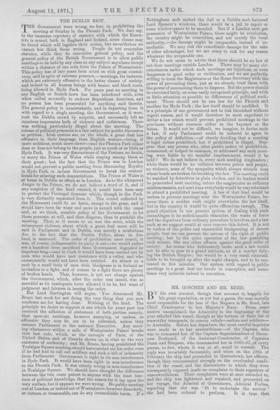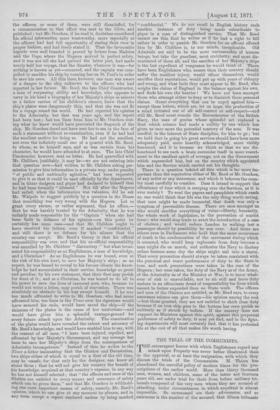MR. GOSCHEN AND MR, REED.
BY his own account, though that account is, happily for his great reputation, as yet but a guess, the man morally most responsible for the loss of the Megtera is Mr. Reed, late Chief Constructor' to her Majesty's Navy. From some motive unexplained, the Admiralty in the beginning of the year selected this vessel, though at the bottom of their list of seaworthy transports, to convey reliefs—sailors and soldiers— to Australia. Before her departure, the most careful inquiries were made as to her seaworthiness—of the Captain who was to command her, of the Captain Superintendent of Sheer- ness Dockyard, of the Assistant-Constructor, of Captains Dunn and Simpson, who commanded. her in 1865-67, of every person, in fact, whom it was at all usual to consult. The reply was invariably favourable, and when on the 28th of February the ship had proceeded to Queenstown, her officers, though they remonstrated strongly on the overloaded condi- tion of the vessel, and the discomforts to which they were consequently exposed, made no complaint to their superiors of uneeaworthinese. Their complaints were at once attended to, and the ship was lightened and repaired, and proceeded on her voyage, the Admiral at Queenstown, Admiral Forbes, reporting that she was " fit to undertake the service" she had been ordered to perform. It is true that the officers, or some of them, were still dissatisfied, for a communication to that effect was sent to the Globe, and published ; but Mr. Goschen, if he read it, doubtless considered his official information more trustworthy, more especially as the officers had had full opportunity of stating their view in proper fashion, and had freely stated it. That the favourable reports were well founded is proved by letters from Madeira and the Cape, where the Megliera arrived in perfect safety, and it was not till she had quitted the latter port, had made nearly half her voyage, that the disaster, whatever it was—for nothing is known as yet—occurred, and the captain was com- pelled to sacrifice his ship by running her on St. Paul's in order to save his crew. All this time, however, one man was aware of a danger to the ship unknown to the officers who had reported in her favour. Mr. Reed, the late Chief Constructor, a man of surpassing ability and knowledge, who appears to carry in his head a biography of her Majesty's ships as minute as a father carries of his children's careers, knew that the ship's plates were dangerously thin, and that she was not fit for a voyage round the world. He had reported his opinion to the Admiralty, but that was years ago, and the report had been lost ; but ten lines from him to Mr. Goschen stat- ing what he knew would have prevented the despatch of the ship. Mr. Goschen dared not have sent her to sea in the face of such a statement without re-examination, even if he had bad the smallest motive for doing so. He had not the smallest, not even the infinitely small one of a quarrel with Mr. Reed, to whom, as he himself says, and as was certain from his character, he would have attended to at once. The late Chief Constructor, however, sent no letter. He had quarrelled with Mr. Childers, justifiably, it may be—we are not entering into that question now—had written to Mr. Childers asking per- mission to give him information in a private way, under penalty "of public and unfriendly agitation," had been requested to give it so that it could be used officially by the department, and in bitter dudgeon and pique had declared to himself that he had been formally "silenced." Not till -after the Mega3ra had sailed, when the information was valueless, did he ask Mr. Walpole to suggest publicly by a question in the House that something was very wrong with the Mega3ra. Let us grant every excuse, or rather argument, that he offers,— that he was harshly treated by the Admiralty, that he was unfairly made responsible for the " Captain " when she had been built in defiance of his opinion—on this point he certainly has some case—and that Mr. Childers ought to have received his letters, even if marked "confidential," and still there is no defence for his silence that the country can accept. Mr. Reed's theory is that his official responsibility was over, and that his ex-official responsibility was annulled by Mr. Childers' "discourtesy ;" but what termi- nated his responsibility as an Englishman, a man of knowledge, and a Christian ? As an Englishman he was bound, even at the risk of his own hurt, to save her Majesty's ships ; as an expert, he was bound to reveal to his former clients the know- ledge he had accumulated in their service, knowledge so groat and peculiar, by his own statement, that their fleet may perish for want of it ; and as a Christian, he was bound to do all in his power to save the lives of innocent men, who, because he would not write a letter, may perish of starvation. There was absolutely no obstacle in his way except himself. If he was too much affronted to write to Mr. Goschen, who had never affronted him, ten lines in the Times over his signature would have secured his ends, would have saved the ship—if the thinness of the plates is the cause of her misfortune—and would have given him a splendid vantage-ground for every future attack upon the Admiralty. The examination of the plates would have revealed the extent and accuracy of Mr. Reed's knowledge, and would have enabled him to say, with the consent of all men, "I have been injured, repelled, and affronted by her Majesty's Government, and my revenge has been to save her Majesty's ships from the consequences of Admiralty incompetence." Instead of this, he writes to the Times a letter insinuating that the Glatton and Devastation, two ships either of which is equal to a fleet of the old time, may be unsafe, for that only he, the designer, can know all about them ; that he will not give his country the benefit of his knowledge, acquired at that country's expense, in any way he has not himself selected ; that "the officers and crew of the Glatton are entitled to every means and assurance of safety which can be given them," and that Mr. Gosehen is withhold- ing one most important means of safety, namely, Mr. Reed's opinion, whicb he can give at any moment he pleases, and in any form except a report rendered useless by being marked "confidential." We do not recall in English history such another instance of duty being made subordinate to pique in a man of distinguished service. That Mr. Reed cannot see this, that he writes as if he had a right to kill sailors in order to punish Mr. Goschen for an affront offered. him by Mr. Childers is, to our minds, inexplicable. Old, Admirals are said to be the most unreasonable of human beings, but take the gnarliest, most crotehetty, and most dis- contented of them all, and the sacrifice of her Majesty's ships is the last expedient of vengeance he would think of. There have been Englishmen who, sooner than their country should suffer the smallest injury, would efface themselves, would sacrifice their reputations, would put up with years of obloquy and wrong, and what fools they must appear to Mr. Reed, who weighs the claims of England in the balance against his own, and finds his own the heavier We have not been amongst those who attempt either to deny or to diminish those personal claims. Grant everything that can be urged against him— except these letters, which are, let us hope, the production of a mind irritated out of all self-control or self-respect—and still Mr. Reed must remain the Reconstructor of the British Navy, the man of genius whose splendid art replaced a fleet which science had made a nullity by one which has given us once more the potential mastery of the seas. It was needful, in the interest of State discipline, for him to go ; but we hold that in going his great services should have been more adequately paid, more heartily acknowledged, more visibly honoured, and it is because we think so that we are dis- heartened to see such a brain surrender itself in mere resent- ment to the smallest spirit of revenge, not on the Government which superseded him, but on the country which appointed, him and the Service which carried out his thoughts.
There is a question behind all this which is far more im- portant than the reputation either of Mr. Reed or Mr. Goschen, of any artist or any statesman, and which it behoves the coun- try most carefully to consider. Does it intend to support the effeminacy of tone which is creeping over the Services, as it is over society ? To read the papers and pamphlets which reach us, one would think that life was the only thing worth saving, that men might be made immortal, that death was only a symptom of preventible disease. There are men amongst us who would sacrifice everything of value—liberty, humanity, the whole work of legislation, to the prevention of scarlet fever ; who would stop trade to avert the introduction of a case of cholera ; and would reduce London to walking lest a passenger should by possibility be run over. And there are others even in Parliament who hold that the more occurrence of death is the condemnation of the movement during which it occurred, who would keep regiments from duty because a man might die on march, and authorize the Navy to disobey orders because some day the ships might sail into a storm. That every precaution should always be taken consistent with the punctual and exact performance of duty to the State is true, and such precautions were taken in the case of the Megeora ; but once taken, the duty of the Navy as of the Army, of the Admiralty as of the Ministry at War, is to incur what- ever of risk is unavoidable, not to sit still and leave duty undone in an effeminate dread of responsibility for lives which cannot be better expended than on State work. The officers and men of the Glatton are entitled, as Mr. Reed says, to every assurance science can give them—his opinion among the rest —but those granted, they are not entitled to shirk clear duty because if an iron ship goes to the bottom her crew perish as suddenly as if struck by bullets. If the country does not support its Ministers against this spirit, against this perpetual preference of safety to duty, it may yet find, and in the fight- ing departments will most certainly find, that it has protected. life at the cost of all that makes life worth having.































 Previous page
Previous page